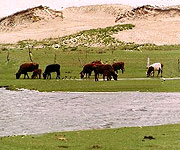 Each year, Baolige, a Mongolian herdsman in Hexigten Banner in the Inner Mongolia Autonomous Region, takes his sheep and cattle to distant Bayan Gol Pasture in early May and returns home in late September.
Each year, Baolige, a Mongolian herdsman in Hexigten Banner in the Inner Mongolia Autonomous Region, takes his sheep and cattle to distant Bayan Gol Pasture in early May and returns home in late September.
In the Mongolian language, Baolige means "spring" and Bayan Gol means "beautiful river." These days, however, grass and water are becoming scarce.
"Over the past few years, the grassland has deteriorated to varying degrees. Parts of Bayan Gol Pasture are becoming increasingly barren," Baolige said, observing his 100 head of sheep and 30 or 40 head of cattle grazing in the field.
In order to earn more money, some people in his village have begun working in the tourism industry in a nearby stone forest.
Another herdsman, Suhe, shared similar concerns. "I have 400 head of sheep. I can't acquire more due to the lack of grasslands."
Suhe is currently working as a guide, accompanying tourists on horseback through the hillside in the National Protection Zone of Grassland in Xilin Gol League of Inner Mongolia. On some days, he earns the equivalent of the sale of one of his lambs.
Together with other villagers, Suhe tames horses for tourism companies in Beijing, which provides additional income for his family.
Over the past few decades, highways have been built on the previously virgin grasslands, extending in all directions. Dry riverbeds line the roads, and spruces uprooted by sandstorms, stretches of desert and unsightly alkali-affected land are common sights.
Cross-country jeeps have replaced the horses of Genghis Khan, the ancestor of Chinese Mongolian herdsmen, on the region's roads.
Today's Mongolian herdsmen are facing the challenges of subsisting on the grasslands in modern society.
Although it is difficult to pinpoint the date when the grassland deterioration began, most concur when the Qing Dynasty (1644-1911) imperial rulers ordered people to cultivate crops on the grasslands of Inner Mongolia, ecological damage was done then.
These policies converted the grasslands into low-yield farm-land, despite the fact that the vegetation and climate were not suitable for this purpose.
As a result of these policies, an increasing number of herdsmen gave up their nomadic lifestyles and settled down. This, in turn, led to the further destruction of the grasslands.
(eastday.com October 23, 2002)
|

